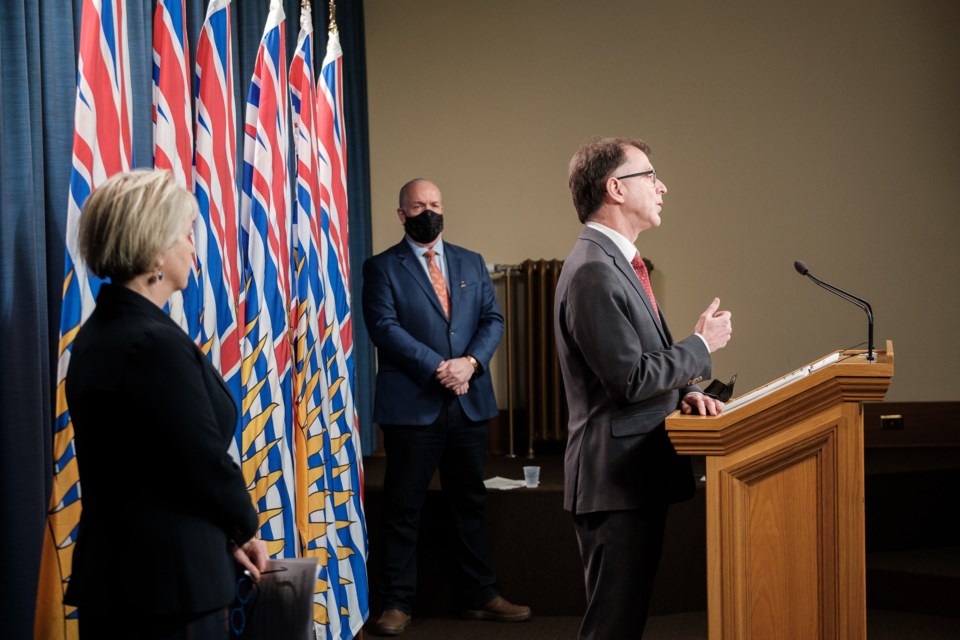The question increasingly asked during the bumpy rollout of B.C.’s mass vaccination program: Is the government bungling this thing, or is it just the nature of a crisis that nothing seems to go according to plan?
The answer is probably a little bit of both. But the longer the COVID-19 pandemic stretches on, the more the shine is coming off the B.C. NDP government’s handling of it.
The latest in a long line of confusing days played out Tuesday when, without any warning, Health Minister Adrian Dix let slip in a pooled interview with B.C. media that pharmacies were about to called upon to distribute doses of the AstraZeneca vaccine to 55-65-year-olds who wanted them in the Lower Mainland.
This was surprising news to a public that had just heard the day prior that B.C. was suspending the use of AstraZeneca, in conjunction with all Canadian provinces, for use on people under the age of 55, due to concerns about rare blood clots.
Less than 24 hours later though, the province was offering the shot …but only in Metro Vancouver, and only for a certain age group and only if you managed to act virtually instantaneously to book an appointment.
When the press release landed hours later, pharmacies were already overwhelmed. All the spots were booked the night before the program was even supposed to open Wednesday morning, leaving thousands of people frustrated at busy signals, overloaded websites, and haggard pharmacists just trying to do their jobs.
It was, in short, a disaster.
Worse than the bungled rollout though was the perception it left with the public that the province’s overall vaccination plans are no longer entirely fair.
While some 55-65-year-olds were able to get the early AstraZeneca vaccine through pharmacies - effectively jumping the line by a month - other 65-72-year-olds have been waiting patiently for word, based on their age, when they can call to book an appointment for the Pfizer or Moderna vaccine.
Dr. Henry launched this whole plan just weeks ago, declaring that age is the single biggest determiner of risk for COVID-19. So why vaccinate a younger group earlier while an older group sits and waits?
There were no good answers from Dix or Henry.
The health minister admitted that the many of the 13,500 AstraZeneca vaccines given to pharmacies were set to expire after the province paused using the vaccine for young people, and so they needed to be jettisoned as quickly as possible.
The 65-72-year-olds are going to get appointments in the coming weeks through the regular Pfizer and Moderna program, he argued, so it made sense to skip them and go to the next cohort.
That argument was not received favourably by 65-72-year-olds, to put it mildly.
Then other communities, like Vancouver Island, started asking: Will pharmacies here get to distribute AstraZeneca like in Vancouver? No, said Dix, Vancouver Island already got a lot of regular vaccines because it has a lot of old people, and so it’s doing perfectly fine. That too seemed a bit dismissive and frustrating.
In case you’ve lost track – and you can be forgiven for doing so – there are now three separate vaccination streams in B.C.:
- The age-based cohort where you dial in to get a Pfizer or Moderna shot;
- The so-called “hero” cohort of teachers, first responders and supply chain workers who will get AstraZeneca if older than 55 (and other vaccines if younger);
- And the new super-quick pharmacy rollout where expiring AstraZeneca shots appear without warning, and gobbled up faster than Taylor Swift concert tickets on LiveNation.
Try keeping all that straight.
It’s a rolling, evolving, messy, bundle of confusion, with changing rules almost every day and entirely new programs and criteria appearing out of thin air.
No wonder people are frustrated.
So, back to the question: Is this the government’s fault, or the nature of the crisis?
It’s fair to argue that in a public health emergency of this scale, any government is just rolling with the punches, trying to do the best it can as the virus is mutating, vaccines are still being researched, and trendlines are worsening in real-time.
But much of B.C.’s problems come down to communication, or lack thereof.
That’s squarely on the shoulders of Premier John Horgan, Dix and Dr. Henry. Over the last year, they have at times been brilliant leaders and communicators. Recently, they have stumbled, and appeared frustrated.
There’s no point casting blame, or taking partisan shots, or lingering on their failures. In the end, they are trying to save lives in an ever-changing world. Their success is worth rooting for, because it helps us all.
But they’ll have to do better in communicating the rationale for their decisions than they have in the past few weeks. Or else, people will stop listening and public confidence will drop.
If that happens, we all lose.
Rob Shaw has spent more than 13 years covering BC politics, now reporting for CHEK News and writing for The Orca. He is the co-author of the national best-selling book A Matter of Confidence, and a regular guest on CBC Radio.
SWIM ON:
- Rob Shaw last wrote about "blowing it," and why blaming the demographic that has also suffered most in the pandemic was astonishing.
- John Horgan is savvy enough to know his “don’t blow it” comments backfired. What’s surprises Maclean Kay is ordinarily he’d also be savvy enough to apologize and move on.
- In October, Blair King drilled into the numbers and decided the Trans Mountain Pipeline expansion project is a good economic bet.



